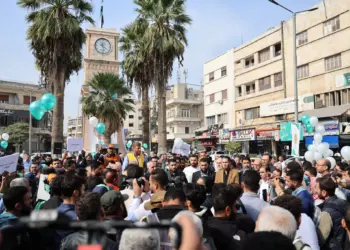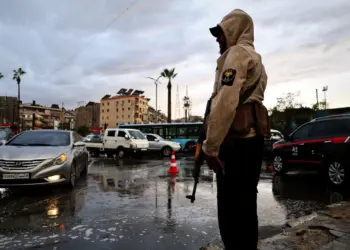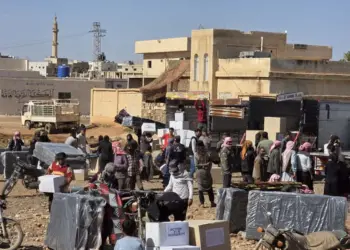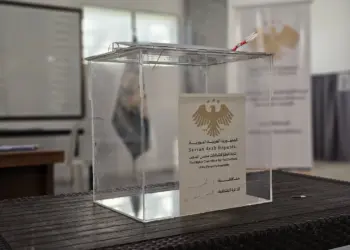US President Donald Trump’s visit to the Middle East last week marked a substantive shift in US policy towards Syria. Upon arriving to the region, President Trump announced the lifting of US sanctions on Syria—measures that had been in place for more than 50 years. The following day in Riyadh, interim President Ahmad al-Shara’a became the first Syrian leader to meet with a US president in decades. This move signals a decisive change in western engagement with post-Assad Syria, and the opportunity must be followed with real mechanisms that support Syria’s future. This opportunity must not be wasted—but also not co-opted.
The easing of sanctions by both the US and the European Union (though the EU has stated that restrictions will remain on certain entities) offers Syria a long-overdue chance to address economic collapse, restore essential services and begin recovery after years of war and isolation. If implemented with care and oversight, this shift could become a pivotal moment in Syria’s post-conflict development—providing the financial and diplomatic space needed for basic service provision, institutional reform and reintegration into international systems. At the same time, it is essential that the international community carefully monitors the process to ensure that sanctions relief does not become a tool for extending authoritarian control.
Sanctions relief & political optics
While also opening the country to international markets, the White House’s decision to lift sanctions lends Syria’s interim administration valuable political capital. Al-Shara’a has been keen to position himself as a viable post-Assad alternative willing to engage with the West. Economically, sanctions relief offers much-needed breathing room, giving the new administration space to begin basic reforms around service delivery and fiscal management. Yet economic stabilization alone will not be enough. Accountability must follow: al-Sharaa’s moves to include figures from communities in his cabinet (Alawi, Druze, Kurdish, Christian) may reflect a technocratic shift, but do not represent structural democratisation.
Lifting sanctions is essential for Syria’s reintegration into the global economy, which is in itself critical for promoting economic growth and development. However, to sustain and maximize the positive impact of sanctions relief, the authorities must undertake broad reforms in economic governance. These reforms should aim to build a more inclusive economy based on transparency, accountability and public participation, which are key measures to prevent the resurgence of a rent-seeking, crony capitalist system. Without such measures, there is a real risk that Syria’s recovery could reproduce the same patronage-based system that fueled conflict and corruption under Bashar al-Assad. The lifting of sanctions is a victory for the Syrian people—but it is also a political win for al-Shara’a that must be carefully managed.
Risks & rewards of sanctions relief
Certainty is not a word that applies to Syria these days. Less than a year ago, the country was facing a spiraling economic crisis under an increasingly despotic regime. Today, the lifting of US and EU sanctions has introduced a dramatically different set of possibilities. Sanctions relief opens a path for Syria’s reintegration into the international economy. If managed responsibly, the influx of cash and investment could help stabilize the economy, support public services and improve living conditions.
Easing sanctions will reduce restrictions on cross-border financial flows and logistics. This could increase operational flexibility for Syrian NGOs, particularly in previously marginalized areas, and may encourage donors to resume funding in education, health and livelihoods. Even more encouraging, the new national currency will be printed in the UAE and Germany, rather than in Russia, thereby signaling a shift away from Moscow’s influence.
At the same time, sanctions are being lifted on a country whose authorities were not elected and whose interim president is increasingly appointing members from his inner circle. Syria risks reverting to the same rentier economic model as under Bashar al-Assad and increasing economic control by the al-Shara’a family, particularly the interim president’s brother, Hazem al-Shara’a, in influencing key economic decisions. If left unchecked, the benefits of sanctions-lifting could be limited to benefits for authorities themselves. While larger investors may benefit from the opening economy, micro and small enterprises are poorly positioned to compete with imported goods or access international markets, putting their survival at risk.
The US’ decision to lift sanctions creates new operational space for Syrian civil society and transitional governance. But it risks empowering a repackaged authoritarianism under al-Shara’a—one that adopts the language of reform while reproducing coercive and exclusionary practices. Civil society actors and international stakeholders must therefore treat this moment not as a blanket victory, but as an opportunity that demands vigilance and accountability. Democratic norms must be prioritized before rebuilding the country.
With sanctions lifted, al-Shara’a is now in a position to implement the rule of law, establish a genuinely representative parliament, ensure a system of checks and balances and protect a free press. These are not just aspirations—they are essential commitments for Syria’s future. It is the responsibility of the international community to ensure these commitments are met. Both those who fled the country and those who remained must know they will not face the same fate they endured under Assad.





